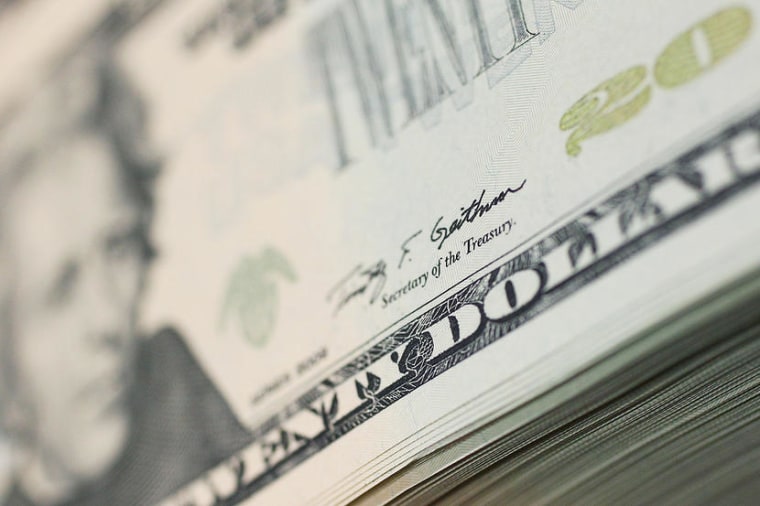Rep. Tom Emmer (R-Minn.), chair of the National Republican Congressional Committee, made an interesting prediction last week about Democrats, the White House's infrastructure plan, and the 2022 midterms. The Hill reported:
"I'm going to tell you right now, and I'll say this out loud and I'll bet McCarthy's house on it — any vulnerable Democrat who votes to increase taxes, corporate or otherwise, will lose their election in November of 2022," Emmer said during a virtual discussion with the Ripon Society last Thursday, according to a press release from the group.
The NRCC chief added, in apparent reference to his party's regressive 2017 tax package, "[Democrats] can certainly undo tax cuts and change things, but they do so at their peril."
Because if anyone can be trusted to give congressional Democrats sound advice about their electoral wellbeing, it's the head of the National Republican Congressional Committee.
The point of rhetoric like this is obvious: Emmer wants to terrify House Democrats who are concerned about their re-election prospects. If he can get in Dems' heads, and they end up balking at President Joe Biden's infrastructure plan because they're afraid to increase corporate tax rates, then Republicans will celebrate the demise of a key Democratic priority.
There's just one nagging detail: Biden's tax plans are popular, and voters rarely punish officials for doing things voters like.
A recent Morning Consult/Politico poll found fairly broad support for an ambitious federal infrastructure bill, paid for by tax increases on the wealthy and big corporations. In an interesting twist, excluding the tax hikes made the plan less popular.
Or put another way, as we recently discussed, ask people about Biden's infrastructure plan, and they say they like it. Let people know that the Biden infrastructure plan includes tax hikes on corporations and the wealthy, and they say they like it more.
The latest national Quinnipiac poll pointed in the same direction:
A plurality of Americans (44 - 38 percent) support President Biden's $2 trillion infrastructure plan, while 19 percent did not offer an opinion. However, support grows for the infrastructure plan if it is funded by raising taxes on corporations, as Biden has proposed. In that scenario, a majority support the infrastructure plan 53 - 39 percent, with 9 percent not offering an opinion.
Poll respondents were initially asked, "Do you support or oppose President Biden's $2 trillion infrastructure plan?" A 44% plurality expressed support for the plan. But the next question asked respondents, "As you may know, President Biden has proposed funding his infrastructure plan by raising taxes on corporations. If it was funded by raising taxes on corporations, would you support or oppose President Biden's $2 trillion infrastructure plan?"
At that point, support jumps from 44% to 53%.
As we discussed soon after, even among self-identified Republicans, support for the White House's plan jumped from 14% to 22% after hearing about increased corporate taxes.
The same poll went on to ask, simply, "Do you support or oppose raising taxes on corporations?" The results showed a two-to-one split: 62% support a corporate tax hike, 31% do not. And while there was another predictable partisan split, more than a third (34%) of Republican voters said they support raising taxes on corporations, and a narrow majority (53%) of white voters without college degrees -- a constituency that made up the bulk of Donald Trump's political base -- agree.
John Anzalone, the top pollster for the Biden-Harris campaign, recently told Axios "his extensive polling and research has found that few issues receive broader support than raising taxes on corporations and people earning more than $400,000 a year."
The report added that Anzalone believes "the White House need not treat the tax increases on the wealthy as some kind of necessary evil. Rather, Team Biden should brag about this because the idea is so broadly popular."
It's against this backdrop that Minnesota's Tom Emmer, chair of the National Republican Congressional Committee, is effectively telling congressional Democrats they'll lose if they vote for the idea that voters like. If given a choice between listening to Emmer and listening to public-opinion research, Dems should probably lean toward the latter.
Update: A new Monmouth poll, released shortly after this post was originally published, found 64% of Americans support paying for new domestic investments by raising taxes on corporations, and 65% support paying for the investments with higher taxes on those making more than $400,000 per year.
Or put another way, the NRCC chair is warning Dems not to vote for ideas that roughly two-thirds of the country already supports.

